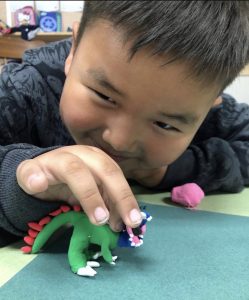I. General Information
School Name: William Konkin Elementary
School District: SD#91 Nechako Lakes
Inquiry Team Members: Jordan Williams: jmwilliams@sd91.bc.ca, Karie Evans: kevans@sd91.bc.ca, Michelle Burt: mburt@sd91.bc.ca, Anna Backhouse: abackhouse@sd91.bc.ca
Inquiry Team Contact Email: kevans@sd91.bc.ca
II. Inquiry Project Information
Type of Inquiry: NOIIE
Grade Levels Addressed Through Inquiry: Primary (K-3)
Curricular Areas Addressed: Language Arts – Oral Language, Language Arts – Writing
Focus Addressed: Indigenous understandings (for example, Traditional Knowledge, oral history, reconciliation), Core competencies (for example, critical thinking, communication, problem solving), Experiential learning, First Peoples Principles of Learning, Inclusion and inclusive instructional strategies
In one sentence, what was your focus for the year? Increasing storytelling and writing skills in English and Carrier languages through story workshop.
III. Spirals of Inquiry Details
Scanning: We used school, district, and Ministry data at the beginning. We used formative assessment throughout. We posed the scanning questions orally to our students and recorded their qualitative responses. We placed value on student perception.
Focus: We were hoping to increase confidence in student communication, both oral and written.
Hunch: By placing too much value on writing and not enough on speaking, we were limiting students’ abilities to demonstrate their learning.
New Professional Learning: We completed a book study together on Story Workshop. We involved Human Resources such as a district literacy specialist. We met for 50 minutes once or twice a month. We kept a record of our meetings.
Taking Action: We decided to purchase story workshop supplies but found the program as outlined in our book study to be unwieldy and impractical. We began to steer more of our learning towards decolonization in our teaching practice by engaging with our team member, Jordan, as to his experiences as an Indigenous learner and now a language teacher. We placed more value on oral storytelling throughout the year.
 Photo (above): Student-created story character.
Photo (above): Student-created story character.
Grade 2 student in a Grade 1/2 classroom sharing an oral character description of a dinosaur.
Checking: The biggest difference we made was in how we will design literacy and language lessons and how we will assess learning from here on in. The four questions are challenging for the learners we surveyed. We found many learners did not understand the questions as they were worded and required extensive explanation in order to elicit even basic responses.
Reflections/Advice: We would not choose to do this book study again, but most of us felt the experience overall was valuable. Through our professional learning, we have chosen a new lens of focus for next year which will be explicit study of decolonization and Indigenization in language learning.
